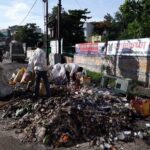Plastic Hurts Minority Communities. Be Eco-Friendly and Anti-Racist by Scaling Back
No Evil Foods, a plant-based meat brand, says plastic is racist. Here’s why: Black, Indigenous, and People Of Color (BIPOC) communities are disproportionately affected by environmental racism – particularly by the production, consumption and disposal of plastic in their neighborhoods. No Evil Foods urges other brands and consumers to take action.
Check out these facts:
- Plastic causes health problems including cancer, cardiovascular and respiratory disease (notably asthma), and childhood leukemia in fence-line communities. (Center for International Environmental Law)
- Black people are 75 percent more likely to live in fence-line communities, where residents are low-income and predominantly BIPOC. (Fumes Across the Fence-Line)
- According to the EPA, there are at least 564 operational landfills and 480 candidate sites in the U.S. as of March 2020. BIPOC communities are more often targeted as prime locations. 79% of the incinerators in the U.S. are also located in BIPOC communities.
- 91% of plastic never gets recycled and a plastic item is used for an average of 12 minutes before it’s disposed of in a landfill or incinerator. Landfills release toxic methane, and burning plastic releases heavy metals, resulting in increased cases of asthma, cardiovascular disease and mortality. These health conditions also make it more likely for minority communities to die from COVID-19.
“It’s imperative for the future of our planet and those who live on it to decrease our plastic consumption and fight to create racial justice, and the truth is, the two are linked. Brands can be doing more to combat the issues,” said Sadrah Schadel, co-founder of No Evil Foods. “Until a full transition to sustainable materials is viable, we believe companies participating in the creation of plastic waste have a responsibility to address its management and disposal. It is the socially responsible thing to do, and No Evil Foods is leading the way as the first plant-based meat brand to be Certified Plastic Negative.”
As a result of the COVID-19 pandemic, we are also seeing the worst rates of food insecurity in the United States in years. Black families are twice as likely to face food insecurity and Hispanic families aren’t far behind. Packaged foods are often the subsidized solution to feeding their families, rather than fruits and vegetables which help lower the risk of many health issues, so the risk for illness in BIPOC is continuously compounded.
“19.1% of Black communities and 15.6% of Hispanics experienced food insecurity in 2019, and those numbers only increased during the COVID-19 pandemic.” said Nicole Hawkins, a registered dietitian. “Not only is this insecurity a result of systemic issues, it increases those communities’ dependence on packaged foods, thus reducing their consumption of healthy fruits and vegetables. As a result, they are getting hit by the toxicity of plastic while also lacking foods that are healthy and fight disease. Brands like No Evil Foods who partner with initiatives like the Plantega Project, are vital to help address the lack of healthy plant-based foods in food insecure communities.”
This systemic, environmental racism is not new, and sadly, plastic remains necessary for its role in food safety. Until an alternative solution is found, consumers can choose to support Plastic Negative/Neutral brands and those who focus on using reusable materials, like Meal Prep and Party, a Black-owned food catering company in Chicago.
Tennae Moore, co-founder of Meal Prep and Party, says No Evil’s commitment to raising awareness of environmental racism is right on time this Earth Day. “Having grown up in the Cabrini Projects in Chicago, with incinerators in the building, this issue really hits home. I saw first-hand the effects of plastic disposal, including its impact on my own reproductive health. That is why a key tenant of my small business is reducing plastic usage. We use glass whenever possible and have a circular recycling program because many of my clients, Black women like me, are two to three times more likely to have fibroids, and more likely to have ovarian cancer, endometriosis and other issues because of plastic pollution in our communities.”
No Evil Foods is leading the charge by being the first Certified Plastic Negative plant-based meat brand; they fund the removal and recovery of twice the amount of plastic that they use in their packaging via a partnership with rePurpose Global. From tackling climate change by creating delicious, plant-based meats and using home-compostable cartons for their products, sustainability is at the core of No Evil Foods. This extends beyond its Plastic Negative environmental commitment to also building sustainable futures for marginalized communities. No Evil Foods aims to fuel the movement towards a better food system, with environmentally- and socially-conscious, plant-based eats.
The brand’s suggested action steps for consumers is:
- Eliminate your use of plastic wherever possible.
- Buy from Plastic Negative/Neutral Certified brands. Take it one step further by getting Plastic Neutral Certified yourself!
- Donate to and support organizations like rePurpose Global and Intersectional Environmentalist.
- Sign up for EarthDay.org’s “End Plastic Pollution” campaign
For more information on No Evil Foods, visit NoEvilFoods.com or @NoEvilFoods on Instagram. Feel free to tag them in your fight against plastic usage, and therefore, environmental racism.
About No Evil Foods
No Evil Foods is a mission-driven business near Asheville, NC focused on impacting environmental sustainability, public health, and animal welfare through better food choices. Every bite of No Evil Foods you take supports our cause: to use food as a force for good, because real change starts at the center of your plate. No Evil Foods product line includes Comrade Cluck ‘No Chicken’, The Stallion Italian ‘Sausage’, El Capitán ‘Chorizo’, and Pit Boss Pulled ‘Pork’ BBQ, all are low in fat, high in protein, and free from cholesterol, nitrates, and antibiotics. No Evil Foods started in 2014 and is now available nationwide in retailers like Whole Foods, Sprouts, and Walmart, as well as co-ops and independents.
SOURCE No Evil Foods
http://tnc.network/the-bridge/
http://tnc.network/the-bridge/



